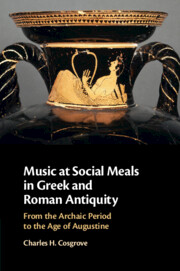Book contents
- Music at Social Meals in Greek and Roman Antiquity
- Music at Social Meals in Greek and Roman Antiquity
- Copyright page
- Dedication
- Contents
- Figures
- Glossary of Musical Instruments
- Abbreviations
- Introduction The Topic and the Sources
- Chapter 1 Sympotic Scenes and Songs
- Chapter 2 The Gentleman’s Lyre
- Chapter 3 Hellenistic Evolutions
- Chapter 4 Poets and Musicians at Upper-Class Greek Banquets
- Chapter 5 Music and Elite Dining in the Roman Age
- Chapter 6 Music at the Social Recreations of the Lower Classes
- Chapter 7 Music at the Suppers and Feasts of the Jewish People
- Chapter 8 Music at Christian Social Meals
- Chapter 9 Purposes and Pleasures
- Bibliography
- Index Locorum
- Subject Index
Chapter 7 - Music at the Suppers and Feasts of the Jewish People
Published online by Cambridge University Press: 18 November 2022
- Music at Social Meals in Greek and Roman Antiquity
- Music at Social Meals in Greek and Roman Antiquity
- Copyright page
- Dedication
- Contents
- Figures
- Glossary of Musical Instruments
- Abbreviations
- Introduction The Topic and the Sources
- Chapter 1 Sympotic Scenes and Songs
- Chapter 2 The Gentleman’s Lyre
- Chapter 3 Hellenistic Evolutions
- Chapter 4 Poets and Musicians at Upper-Class Greek Banquets
- Chapter 5 Music and Elite Dining in the Roman Age
- Chapter 6 Music at the Social Recreations of the Lower Classes
- Chapter 7 Music at the Suppers and Feasts of the Jewish People
- Chapter 8 Music at Christian Social Meals
- Chapter 9 Purposes and Pleasures
- Bibliography
- Index Locorum
- Subject Index
Summary
Chapter 7 examines music in various Jewish meal-settings: elite Jewish banquets, rabbinic dinners, wedding feasts, public festivals, and the communal meals of the Jewish sects. Music and social dining were occasions for self-definition, personal and corporate, as Jewish elites sought to place themselves along a continuum from resistance to assimilation in relation to the prevailing non-Jewish culture in the Diaspora and foreign rule in Palestine. The occasions included upper-class Jewish dinner parties, as well as Jewish festivals, where national music helped define Jewish identity in settings that included private dinner parties and mass public dining. The Jewish festival was also an occasion for social interaction between Jews and non-Jews. A smattering of non-Jews attended Jewish festivals, and there is reason to believe that many Jews attended the public banquets of the gentiles. Moreover, upper-class Jews such as Philo, who had Hellenic educations, were interested not only in cultivating relationships with upper-class Greeks by dining with them but also in believing that their own people had music just as fine as that of the Greeks and just as ancient in its foundations.
Keywords
- Type
- Chapter
- Information
- Music at Social Meals in Greek and Roman AntiquityFrom the Archaic Period to the Age of Augustine, pp. 265 - 305Publisher: Cambridge University PressPrint publication year: 2022

